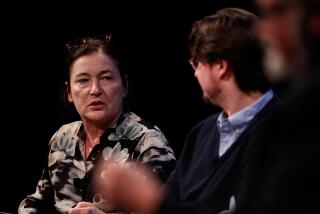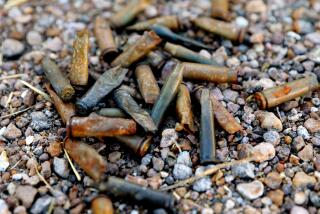‘Bitter Spring: A Life of Ignazio Silone’
Bitter Spring
A Life of Ignazio Silone
Stanislao G. Pugliese
Farrar, Straus & Giroux, 426 pp., $35
“Fontamara” and “Bread and Wine,” Ignazio Silone’s passionate novels of peasant life and political awakening, are iconic works for anyone who cherishes the literature of social commitment. Inspired by primitive Christianity and revolutionary socialism, Silone portrayed an oppressed, impoverished people’s longing for justice and freedom with a unique moral sensibility. An implacable enemy of Mussolini, he helped found the Italian Communist Party in 1921. Yet by the time he began writing fiction from exile in Switzerland, he was engaged in a torturous debate over Stalinist tactics that resulted in his expulsion from the party in 1931. For the rest of his life, Silone would speak and write for those who rejected the horrors of both fascist and communist totalitarianism but who also strove to disentangle Western democracy from its embrace with rapacious capitalism.
Like George Orwell and Albert Camus, Silone was and is a patron saint of the independent left, yet his reputation has been dogged by accusations of spying for the CIA and informing for the fascists. One of the many virtues of Stanislao Pugliese’s astute biography is that the author makes us understand that it’s impossible to render simple judgments about those accusations. Pugliese, who has written two previous books about Italian antifascism, persuasively identifies Silone as “an enigmatic yet representative figure of the twentieth-century intellectual swimming in the rough seas of history and ideology.”
He plunged into those seas from the timeless world of Southern Italy’s rural peasantry. The 1915 earthquake that killed his mother and 3,500 others in his village of Pescina underscored 14-year-old Secondino Tranquilli’s experience of life as essentially tragic, subject to the vicissitudes of nature. The crooked distribution of funds intended for earthquake victims reinforced his contempt for a corrupt ruling class and the Catholic Church that buttressed its authority.
Secondino became a Socialist at 17 and joined the Communist underground at 21. He crisscrossed Europe doing clandestine work and was jailed many times; he adopted the name Ignazio Silone in a Spanish prison. He accepted, for a while, the need for ruthlessness and may have acted as a double agent on orders from his superiors. But he was increasingly repulsed by the party’s suppression of dissent. He had rejected the church because it preached unquestioning submission; he would ultimately reject communism for the same reason.
In Switzerland, freed from the “Bolshevist nightmare,” he discovered his true calling: “a writer, tied to no other discipline except that which my thinking and conscience master.” His novels would reassert his solidarity with the peasants whose sufferings had made him a radical and would bring the fight against injustice to life for the thousands who would never read a Marxist tract. But after World War II began, Silone could not remain politically aloof. He rejoined the Italian Socialist Party and from its foreign office in Zurich worked with Allen Dulles of the U.S. Office of Strategic Services to funnel money to antifascist groups in Italy. His link to Dulles, later head of the CIA, gave rise to charges that Silone had spied for the Americans. The truth, Pugliese shows, was considerably more complicated.
Silone and his fellows on the noncommunist left were desperately seeking a new path. They knew the Soviet Union’s pose as champion of the oppressed was a lie; the Moscow show trials and Siberian prison camps made clear what they could expect from communist rule. But they had no desire to reconstitute the prewar European order and restore to power an elite that had failed to resist, and in some cases collaborated with, fascism. They hoped for a democratic socialism that would foster economic equality and political liberty, and the New Deal seemed a reasonable approximation of that ideal.
Silone’s activities from the war’s end until his death in 1978 show a man who refused to believe the world was divided into “two irremediably opposed camps” and who encouraged the quest for freedom wherever it was found. As editor of the journal Tempo Presente, he denounced the Soviet invasion of Hungary and McCarthyism in the United States. He published Willy Brandt’s protest against the construction of the Berlin Wall and verbatim transcripts of the Union of Soviet Writers’ expulsion of Boris Pasternak. He supported Algeria’s war for independence and African Americans’ struggle for civil rights.
Silone’s books were suppressed behind the Iron Curtain, and he was on the State Department’s list of “undesirable” visitors. Accepting the 1969 Jerusalem Prize for literature, he mentioned “the most unhappy fate” of Palestinian refugees and expressed “hope that the Israeli people, who have known such bitter sorrow, will eventually propose an equitable and generous solution to this sad situation.”
By then, Tempo Presente was defunct. Silone had been given proof of what he must always have suspected: that the journal’s funds from the Congress for Cultural Freedom, in fact, came from the CIA. He shut it down in 1968, the same year he declared his sympathy for the student protesters taking to the streets across the Western world. Silone, like those protesters, could not create independent institutions to support an independent progressive movement.
Silone memorably characterized himself as “a Socialist without a Party, a Christian without a Church.” Pugliese’s judicious narrative does not devote an undue amount of space to Silone’s private life or psychological makeup, but the biography captures with telling details a meditative, skeptical and ironic man, deeply rooted despite all his cosmopolitan experience in a peasant culture resigned to disappointment in an imperfect world. This cogent portrait makes it easy to understand why the writer in his later years was increasingly drawn to the quiet spirituality of those who sought to live in personal harmony with God, reflected in his play “The Story of a Humble Christian” and in his close study of Simone Weil’s writings.
“Silone has left us on a threshold, asking us to pursue an ideal of justice that may be illusory,” Pugliese writes. “Our only salvation is in a compassionate encounter with human beings who suffer and struggle against a common fate.” Silone defined his bedrock faith with even more simplicity and modesty in his final, unfinished work, a novel about a contemporary nun who, when asked on her deathbed if she still believes, replies, “I hope. What remains is hope.”
Smith is the author of “Real Life Drama: The Group Theatre and America, 1931-1940.”
More to Read
The biggest entertainment stories
Get our big stories about Hollywood, film, television, music, arts, culture and more right in your inbox as soon as they publish.
You may occasionally receive promotional content from the Los Angeles Times.






